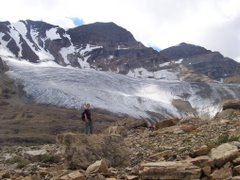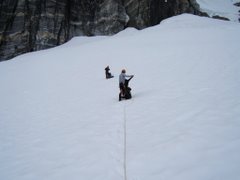Their home was cold and harsh, with no McMurdo Dorms to seek refuge in, and winter's never-ending howling darkness challenged their mental and physical capabilities.
 Along the way we came across 3 Adelie penguins huddled against the 20-30 knot gusts that bombarded us (the flats had to stay in my pocket, or risk being whisked away into the Ross Sea). They had a nice time riding in the Delta and meeting new people.
Along the way we came across 3 Adelie penguins huddled against the 20-30 knot gusts that bombarded us (the flats had to stay in my pocket, or risk being whisked away into the Ross Sea). They had a nice time riding in the Delta and meeting new people.
The hut was built in New Zealand and reassembled in 2 weeks at Cape Evans...
 Inside tins of food and coffee and bunks smaller than children's beds for grown men to curl up in...
Inside tins of food and coffee and bunks smaller than children's beds for grown men to curl up in... A chemistry lab that likely rivaled any other built during its time.
A chemistry lab that likely rivaled any other built during its time. And the Ross Sea gritty and barely catching blowing snow, making walking slippery without thick treads and dedication. Can you imagine looking across this vast landscape and deciding to walk South, further into the blasting wind, further into the freezer?
And the Ross Sea gritty and barely catching blowing snow, making walking slippery without thick treads and dedication. Can you imagine looking across this vast landscape and deciding to walk South, further into the blasting wind, further into the freezer? On the ride home, an astrophysicist from Caltech who had wintered-over at the Pole detailed how they are using microwave telescopes to view the farthest margins of our universe. Our universe is surprisingly aged-constrained at around 13.7 Billion years old, with this new telescope able to reach out to when our universe was a nascent 300 million years old. At this time our universe was opaque. So hot that electrons scattered, unable to join with protons and neutrons to form even the most basic elements, light did not exist as we know it now. Today, in the same breath as Scott, the universe is bright. Antarctica is a blinding cold mesmerizing place, where it seems that little remains of our Universe's fiery origins.
On the ride home, an astrophysicist from Caltech who had wintered-over at the Pole detailed how they are using microwave telescopes to view the farthest margins of our universe. Our universe is surprisingly aged-constrained at around 13.7 Billion years old, with this new telescope able to reach out to when our universe was a nascent 300 million years old. At this time our universe was opaque. So hot that electrons scattered, unable to join with protons and neutrons to form even the most basic elements, light did not exist as we know it now. Today, in the same breath as Scott, the universe is bright. Antarctica is a blinding cold mesmerizing place, where it seems that little remains of our Universe's fiery origins.



No comments:
Post a Comment